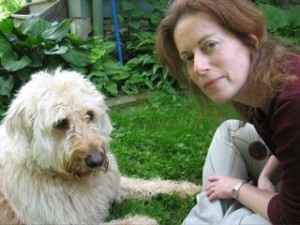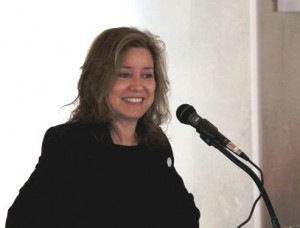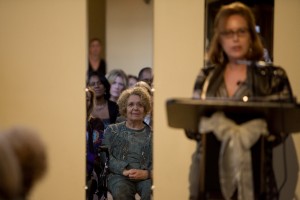Last week, we published Part 1 of our interview with Charlotte Eulette, the International Director of the Celebrant Foundation & Institute, and Dorry Bless, Board Member and Funeral Committee Chair of the Institute. We continue our conversation about celebrants here by discussing not only who the celebrants are, but who their clients are; and what the clients look for– and find– in a celebrant ceremony.
Liz: What religious and cultural backgrounds do your clients come from?
Dorry: It runs the gamut. All socioeconomic classes. We have celebrants who are bilingual, so some ceremonies are bilingual or multilingual. We have interfaith families, secular, agnostic, atheist. Our celebrants also run the gamut, from bachelor of arts—most are college-educated but not all—to masters, PhDs. Celebrants who were school principals, massage therapists, attorneys, special event planners, professional storytellers, theater actors, directors, playwrights. We even had a truck driver.
Charlotte: Librarians are big!
Dorry: So our celebrants run the gamut. The youngest, I think, is 27, and the oldest mid-80s. And as I said, our clients also run the gamut, in terms of who we serve and who is inclined to contact the celebrant. It’s typically someone who really wants to get involved in the ceremony: sometimes their faith tradition does not allow that, sometimes they’re no longer affiliated with their faith, sometimes they’re interfaith, agnostic, or atheist. Perhaps they’re spiritual but not affiliated. So we get really a very broad base in both who the celebrant is and who the client is.
Charlotte: There are a few studies we’ve looked at that have statistics on the face of the new American family. A lot of people are spiritual, but not religious. They like to bring cultural traditions into the ceremony, but may not be inclined to bring in all the religious aspects.
Dorry: There was a new millennial survey by Georgetown University last year that shows that, of the millennial generation, a quarter now do not identify with a religious faith. And that’s growing.
Liz: Would you say this new spirituality, or whatever you want to call it, is a factor in the rise of the celebrant movement?
Dorry: I think that has some bearing on it. There are plenty of ceremonies we do where people would identify or consider themselves a certain faith. I actually did a funeral for a lay minister, whose father was a minister, and his grandfather was a minister, all in the Catholic faith. This man was in his 80s and he sang every week in the choir, as did his three sons. Yet I had done a funeral for his granddaughter a few years prior, and apparently he was so taken by it that on his deathbed he decided not to have ministers of his church, and instead wanted a celebrant ceremony.
It’s the same with weddings. Time and again, couples are interfaith, or perhaps the bride’s parents might be Christian and very involved in the church but their daughter does not subscribe to it the same way her parents do. And her fiancé chooses a celebrant, and the parents are okay with that. I think sometimes that’s the biggest surprise: people come up to us all the time explaining how meaningful it was. I live in a small community in New Jersey, a lot of seniors and church-going folk; but when I started doing funerals here in my town, I was surprised that they wanted it, and the biggest surprise was the reaction from seniors about how moved they were by the ceremony. I think that’s because it was personal.
Charlotte: I think the reason is, these people get what ritual is, so when they see it done well, they acknowledge it. At a wedding a couple weeks ago, when I said I was the celebrant, a gentleman looked at me and said, “You are going to be doing it?” He was the grandpa, picking up the tab, and he just shook his head. Well, in the ceremony, we honored the groom’s father who had died the year before of cancer by having a moment of silence; we talked about how Nick would have loved to have been there and had the dance with his daughter-in-law. (A lot of weddings do have funeral aspects to them.) The gentleman who had shaken his head was this man’s dad, the grandfather of the groom. So he came up to me afterward and said, “I’m so sorry; that was the most moving spiritual ceremony I’ve ever been to, and I’m humbled by it. I thank you. How can I become a celebrant? Am I too old?”
These things happen. It’s universal. Once there’s a ceremony that’s really authentic and rings a chord with people, no matter where you’re from, it stops you in your tracks. You see that this is very much honoring these people’s lives. We even have priests from church call us and say, “We can’t do a ceremony for these people–” maybe because they’re interfaith or same-gender–“maybe you can help them with this ceremony.” So we come to the rescue.
That’s a big component of celebrant ceremonies: connection. The ceremony is designed to connect the community… It’s really an invitation to all to stop, not fit any prescribed rules, and just allow themselves to be human at that moment in time.
Dorry: That’s a big component of celebrant ceremonies: connection. The ceremony is designed to connect the community, connect them with the story. The baby that’s getting welcomed, the couple that’s getting married, the person who just died. The connection comes from telling the story. The age-old human connection is storytelling, and remembering the ancestors. That can happen in every ceremony, not just a funeral. It’s really welcoming people who have gathered to participate and witness the ceremony by letting them know their presence is essential to what is happening at the moment. It’s really an invitation to all to stop, not fit any prescribed rules, and just allow themselves to be human at that moment in time.
Liz: Any words of advice you can leave our SevenPonds readers with regarding planning and personalizing an end-of-life ceremony?
Charlotte: Well, they can definitely go to our website and choose a celebrant in their region. There are photos and bios, and when they click on them they can talk to the celebrant.
Dorry: SevenPonds actually did an interview with one of our home funeral specialists in the past, so we have a few of those for interested clients.
Charlotte: It’s important to talk to more than one to see who rings true for you, and to know that you have an opportunity to honor your loved one’s life in a way that you see fit. People sometimes forget. They think they don’t have a choice.
Also, they might think that things happen too quickly when they’re planning. You can always plan a memorial with the celebrant as well; it doesn’t only have to be a funeral. There might be other things you want to do: interment of ashes, scattering of ashes, mingling ashes with Mom and Dad, green burial. Those are things that are important for people to realize: Yes, they can do it! A celebrant is there to help them and guide them. We are a nonprofit, educational organization and they can feel free to call us. We will be a loving and warm heart to them.
Dorry: I would really agree with what Charlotte said. If there’s a celebrant in their community, take the time or moment to make the call and see if that’s the right fit for them. A celebrant ceremony might offer for them what they really need during a transitional time: being deeply listened to, telling the story of the loved one, having it told to their friends and family in the ceremony, being able to be as intimately involved as they choose. Sometimes, really giving people a purpose during those first few days after their loved one has died is important: collecting things that are meaningful and important, whether it’s hiking shoes or pictures.
I did a ceremony for a woman who died in her 80s and we made a picture board of every animal she owned. There were 30 animals up there. It really felt like they were present, and that was a part of who she was and what was important to her. It can be so encouraging and guiding to a family or individual to put those things together. They might be overwhelmed with forms and death certificates and insurance and meeting with the funeral home, if they’re going that route, so being able to exercise a different part of their heart and brain is great.
We don’t look at it as closing, rather as creating, opening a window in their life that is going to be different. It’s a life transition. From this point on, being able to ease into that in a way that supports them is what we hope to offer.
Charlotte: What we’re really saying, if we have one message, is it’s not about closing. Instead of closure, let’s have opening!
Dorry: Yes; instead of saying you have to get to the end of the road, we say let’s nourish where you are now.
Liz: That’s a great way of looking at it. Thanks so much for speaking with us, Dorry and Charlotte!

 What is a Celebrant? An Interview with Charlotte Eulette and Dorry Bless, Part 2
What is a Celebrant? An Interview with Charlotte Eulette and Dorry Bless, Part 2





 Forest Bathing Eases Grief by Soaking in Nature
Forest Bathing Eases Grief by Soaking in Nature
 The Spiritual Symbolism of Cardinals
The Spiritual Symbolism of Cardinals
















This is good to read regarding the thought and planning put into creating rituals for a funeral. When someone dies it’s nice to know there is assistance for a service so personal to a family.
Report this comment